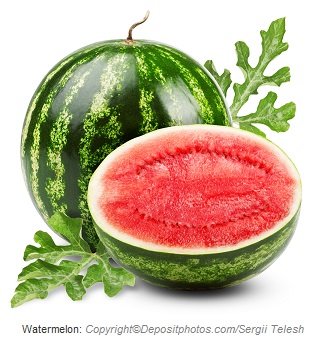There are hundreds varieties of watermelon with different sizes. The flesh could be red or  yellow, with seeds or without seeds. Every 100 grams of watermelon provides about 8 grams of carbohydrates. It is very poor in protein and fiber.
yellow, with seeds or without seeds. Every 100 grams of watermelon provides about 8 grams of carbohydrates. It is very poor in protein and fiber.
Average calories: 32 per 100 grams of fruit.
|
Watermelon: 100 grams |
|
|
Carbohydrate |
8 |
|
Fiber |
0 |
|
Protein |
0 |
|
Fat |
0 |
|
Calories |
32 |
Vitamins found in higher amounts: vitamins C, A and B6.
Minerals found in higher amounts: watermelon is very low in minerals in general. However, it contains some potassium and magnesium.
Phytonutrients found in higher amounts and their health benefits: watermelon is rich in carotenoids (especially lycopene, and beta-carotene), flavonoids, and triterpenes. Lycopene is a potent antioxidant with anti-cancer and anti-inflammatory effects. Carotenoids are good for healthy vision and prostate gland.
Flavonoids are also antioxidants with anti-inflammatory and anti-allergy effects. They may improve blood circulation, help lower blood pressure and blood sugar, and support cardiovascular health.
One of the triterpenes found in watermelon is cucurbitacin E, which fights inflammation.
Watermelon has a diuretic effect, which makes it useful in people with high blood pressure.
A unique phytonutrient in watermelon is citrulline. It is a nonessential amino acid that delays muscle fatigue by increasing reabsorption of lactic acid and re-synthesis of ATP (adenosine triphosphate). In fact, there is an inverse relationship between citrulline and lactic acid in the muscles. Also citrulline increases the production of arginine, an amino acid that improves blood flow to the muscles. One cup of watermelon provides approximately 250 mg of citrulline.

